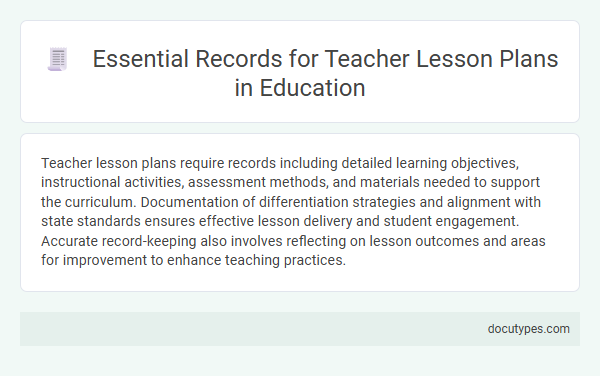Teacher lesson plans require records including detailed learning objectives, instructional activities, assessment methods, and materials needed to support the curriculum. Documentation of differentiation strategies and alignment with state standards ensures effective lesson delivery and student engagement. Accurate record-keeping also involves reflecting on lesson outcomes and areas for improvement to enhance teaching practices.
Importance of Maintaining Teacher Lesson Plan Records
Maintaining comprehensive records of teacher lesson plans is crucial for ensuring instructional consistency and meeting curriculum standards. These records typically include objectives, materials, activities, and assessment methods tailored to specific lessons. Proper documentation supports effective teaching strategies, facilitates communication with administrators and parents, and aids in continuous professional development.
Key Components of Effective Lesson Plan Documentation
What records are required for teacher lesson plans? Effective lesson plan documentation includes clear objectives, detailed activities, and assessment methods. You should also record materials needed, time allocation, and adaptations for diverse learners to ensure comprehensive planning.
Attendance Records: Tracking Student Participation
Attendance records are essential components of teacher lesson plans, serving as accurate documentation of student participation. Maintaining precise attendance helps monitor engagement and supports administrative requirements.
Teachers must record daily attendance to track which students are present, tardy, or absent. These records provide valuable data for assessing student involvement and identifying patterns that may affect learning outcomes. Your lesson plans should include a system for consistently documenting attendance to ensure compliance with school policies and enhance classroom management.
Curriculum Mapping Documents for Lesson Planning
Effective lesson planning requires maintaining detailed and organized records that align with curriculum standards. Curriculum mapping documents serve as a vital resource for ensuring your lesson plans meet educational goals.
- Curriculum Guides - Outline the scope and sequence of topics to be covered throughout the academic year to maintain consistency.
- Standards Alignment Documents - Ensure each lesson plan meets specific state or national educational standards for measurable outcomes.
- Unit and Lesson Maps - Break down curriculum guides into manageable units and lessons, providing clear objectives and assessment criteria.
Keeping comprehensive curriculum mapping documents streamlines lesson planning and supports instructional effectiveness.
Assessment and Grading Logs
Teacher lesson plans must include detailed assessment records that track student progress and understanding of the material. These records help in identifying areas where students excel or need additional support.
Grading logs are essential for documenting scores, feedback, and overall student performance throughout the course. Maintaining accurate and organized logs ensures your grading process is transparent and consistent.
Resource and Material Inventories
Teacher lesson plans require detailed records of resource and material inventories to ensure effective lesson execution. These inventories include textbooks, digital tools, and supplementary materials necessary for each lesson.
Maintaining accurate inventories helps you track available resources, avoid shortages, and plan future lessons efficiently. Clear documentation supports curriculum alignment and enhances classroom organization.
Differentiation and Individualized Instruction Records
| Record Type | Description | Importance for Differentiation and Individualized Instruction |
|---|---|---|
| Student Learning Profiles | Documentation of each student's learning preferences, strengths, weaknesses, and needs. | Essential for tailoring lesson plans to accommodate diverse learning styles and abilities. |
| Assessment Data | Records of formative and summative assessments highlighting student progress and areas requiring support. | Guides instructional adjustments to meet individual learning goals and ensures targeted interventions. |
| Individualized Education Program (IEP) Goals | Specific objectives outlined for students with special education needs, including accommodations and modifications. | Ensures lesson plans comply with mandated legal requirements and focus on student-specific objectives. |
| Instructional Strategies Documentation | Notes on differentiated teaching methods, scaffolding techniques, and personalized activities used in lessons. | Supports planning for multiple ability levels and diverse learner engagement. |
| Student Work Samples | Collections of completed assignments demonstrating students' understanding and progress. | Helps in evaluating the effectiveness of differentiated lesson components and refining instruction. |
| Learning Environment Adaptations | Records of classroom setups, assistive technologies, and resource allocations supporting individualized learning. | Facilitates an inclusive environment that addresses varied student needs and learning challenges. |
| Reflection and Feedback Notes | Teacher's observations and student feedback on instructional approaches and lesson effectiveness. | Informs future lesson plan revisions to better align with student growth and preferences. |
Your lesson planning records should comprehensively capture these elements to ensure effective differentiation and individualized instruction tailored to each student's unique learning profile.
Communication Logs with Parents and Guardians
Maintaining detailed communication logs with parents and guardians is essential for teacher lesson plans. These records support transparency and foster collaboration between educators and families.
- Contact Dates - Document the specific dates when communications with parents or guardians occur to track engagement over time.
- Communication Methods - Record whether the interaction was via phone, email, in-person meeting, or digital platform for comprehensive tracking.
- Discussion Content - Summarize key points discussed, including student progress, concerns, and action plans to ensure clear follow-up.
Professional Development and Reflection Journals
Teacher lesson plans must include detailed records of professional development activities attended throughout the academic year. Reflection journals documenting your insights and growth from these experiences provide critical evidence of ongoing teacher improvement. Maintaining these records ensures alignment with educational standards and supports effective instructional strategies.
What Records Are Required for Teacher Lesson Plans? Infographic

